|
Concern over local government’s overall ability to reliably deliver services to citizens has been strengthened by findings in a report by the Ethekwini Municipality, which raises concerns over board member appointment processes, inductions and ongoing training at two of its municipal entities.
These findings align to common issues that we have identified over several years of performing board evaluations and governance advisory services in the public sector. The IoDSA has repeatedly spoken out in the media and in commentary to government that directors need specialised training in governance and other directorial skills in order to discharge their duties properly, and that these specialist skills need to be kept up to date via rigorous continuous professional development. “Municipal entities in general are at the coalface of service delivery and, at the end of the day, if any entity is not delivering on its mandate, its board needs to be held accountable and face the consequences,” says Natesan. The IoDSA currently trains more than 6 000 directors and prospective directors annually, and has introduced two professional designations—Chartered Director (SA) and Certified Director (SA). These designations provide a credible framework that enables directors to acquire the necessary skills through training, prove them through certification, and then maintain them through continuous professional development. “The question of specialist skills also speaks to the whole nomination process, which we have found to be a challenge, particularly in the public sector. Too often, appointments are made on political or other inappropriate grounds, thus effectively setting the organisation up for failure,” Ms Natesan says. She argues that board nominations need to be the result of a formal and robust process conducted by an independent and qualified nominations committee that undertakes the necessary due diligence on each candidate. “It’s vital that only individuals who have the knowledge, skills and experience that the organisation requires are put forward. In addition, candidates should also enough time to discharge their board commitments, and lack of conflicts of interest,” she says. NOTE TO EDITOR This media release replaces one issued on 29 June 2021 entitled uShaka Marine World crisis makes the case for the professionalisation of directorship in local government, which was based on a published news article. The IoDSA has since received the Ethekwini Municipality Audit Committee report and has revised the media release. The original media release was not intended as findings or judgments by the IoDSA on uShaka Marine World, as may have been perceived. The comments were intended to be informative and general in nature, based on best practice in governance as informed by years of conducting board evaluations and governance advisory projects. ENDS MEDIA CONTACT: Stephné du Toit, 084 587 9933, [email protected], www.atthatpoint.co.za For more information on the IoDSA please visit: Website: www.iodsa.co.za Twitter: @The_IoDSA LinkedIn: Institute of Directors in South Africa Company Page
0 Comments
The massive fire at the warehouse of chemicals company UPL in Durban has created an environmental disaster whose scale is still not clear, and has put the company into the headlines for all the wrong reasons. While the facts are not yet confirmed, it’s clear that the incident holds many lessons for directors and regulators across all industry sectors, says Advocate Fay Mukaddam, Chartered Director and Technical Advisor at the Institute of Directors in South Africa (IoDSA).
“When something on this scale happens, those who are accountable need to take a hard look at what went wrong. Perhaps even more important, though, corporate and government leaders everywhere need to tease out what the lessons are, and have the humility to see what they can learn,” she says. “Directors, in particular, bear the ultimate accountability for anything that happens to their organisation, and so should be looking at this disaster very carefully. There are key lessons we should all take to heart.” Some of these lessons include: What does leadership actually entail? Organisations need to understand the impact they have, or could have, on the economy and society, and thus what being an ethical and effective corporate citizen means. In this instance, it seems clear that there simply wasn’t a deep enough examination of the stakeholder universe, and what that meant for its business strategy. At a broader level, both directors and regulators need to consider what leadership means in the context of being a good corporate citizen—King IV pairs ethics and effectiveness when defining leadership, which should be informed by integrity, competence, responsibility, accountability, fairness and transparency (iCRAFT). Does the board and executive team understand the reputational issues? A company’s reputation can be destroyed in an instant, not so much by a catastrophe but by how the company responds to it—with considerable impact on its bottom line. “The temptation to take a short-term view and play one’s cards too close to one’s chest will have long-term consequences,” she says. “To drive sustainability, directors must move from a short-term to a long-term value creation view.” A related issue here is that of crisis communications. How well a company survives a disaster is intimately connected to how well it communicates as events unfold. It seems clear that neither UPL nor the regulator or other parties concerned had an effective crisis communication strategy, leaving an exceptionally broad body of stakeholders largely in the dark about something that could have severe health and environmental ramifications. Is your risk management up to scratch? For UPL’s directors, a big question has to be whether this risk was foreseeable. One might perhaps argue that social unrest on such a scale was unforeseeable, but even that is highly debatable given the facts of South African life. But there’s no doubt that a catastrophic event (no matter its nature) should have been foreseen, and contingency plans put in place. All directors should be subjecting their risk strategies to minute scrutiny. Do you have mitigation strategies in place should the unthinkable happen? “As I’ve said, the facts are still being investigated, but two aspects of what has occurred are hugely disappointing from a board leadership perspective,” says Advocate Mukaddam. “One is the retreat into a laager, with both company and regulator clearly reluctant to give out any information lest, it seems, they admit liability. One gets the impression that lawyers and insurers are leading the conversation whereas the best interests of those affected should be at the forefront. A constructive and stakeholder inclusive approach that brought together all role-players to fast-track ways to fix the problem would have been infinitely preferable—and would have paid off in the long term. “In a situation like this, we all want individuals to step forward and take responsibility for putting things right, not to resort to the smokescreen of legalese.” The firefighters were casualties of this legalistic approach as they appear to have not been given information about the nature of the chemicals in store, with potentially grave consequences for their own health and safety. This information would have also ensured that the way they fought the fire could have been adjusted to reduce the risk of widespread contamination. The broader public also was deprived of potentially important information about the health risks it faced as the fire blazed and the contamination spread. “Directors and regulators alike need to be looking at the UPL disaster to see what they can learn, and at a minimum, I would hope that they are stress-testing their own contingency plans.” ENDS MEDIA CONTACT: Stephné du Toit, 084 587 9933, [email protected], www.atthatpoint.co.za For more information on the IoDSA please visit: Website: www.iodsa.co.za Twitter: @The_IoDSA LinkedIn: Institute of Directors in Southern Africa Company Page Business Day reports that government is planning to intensify the vetting of non-executive directors and other employees at SOEs to improve the quality of appointments.[1] These moves are long overdue and should be welcomed—but with caution, says Parmi Natesan, CEO of the Institute of Directors in South Africa (IoDSA).
“For many years, the IoDSA has been calling for reform in how board appointments are made in order to put SOEs back on track,” she says. “So much so that we provided input to the Department of Public Services and Administration many years back on a guide to the appointment of SOE directors, but we are not aware of it ever being approved or applied.[2] The brutal truth is that implementing good governance best practice will require the state to make some hard choices, and we have yet to see whether there is genuine political will to drive through the necessary changes.” One of the elements highlighted in the news report is better vetting via stringent background checks before appointments. However, it must be recognised that this vetting process must be extremely detailed and goes beyond merely performing the standard identification, qualification and criminal checks, but should extend to investigating candidates’ knowledge, skills and experience, as well as other necessary personal characteristics. The article also indicates that there are no uniform criteria for the recruitment of board members, which is a concern. Directors have a very specific governance role, and need specific skills to discharge it. While there are no legally mandated, uniform criteria for board members, the IoDSA has developed a robust director competency framework that covers the skills that every director needs in order to be able to serve effectively. “The King Reports make it very clear that directors have a critical role to play, and they need the right skills to do so. Given the importance of the role, and the substantial personal risk that board members carry, the IoDSA believes it’s necessary to professionalise directorship. We have developed two director designations that are approved by the South African Qualifications Authority that will allow directors to gain the right skills and then maintain them via continuous professional development obligations,” she explains. “Becoming a Chartered or Certified Director (SA) not only means you demonstrably acquire an objectively designed skillset contained in the Director Competency Framework, you also become subject to a professional code of conduct, under which you can be disciplined.” This should be taken into account when appointments are made. Another key challenge for the public sector has been a lack of role clarity, again something that the IoDSA has frequently highlighted, most notably in its 2019 paper “Challenges facing public sector boards”. The challenge has always been that SOE founding legislation frequently gives the state, as sole shareholder, the power to appoint both directors and senior executives. By contrast, governance best practice reserves the right of appointing these senior positions to the board. This is logical because it is the board, not the shareholder, which is accountable for the organisation’s performance. “To implement good governance and improve organisational performance, the state will have to recognise that its criteria for appointing senior roles can no longer be subject to political considerations, and should focus on what the organisation actually requires to fulfil its mandate. The shareholder would be well advised to consult the board throughout the process, and make it clear that appointees answer to the board and have a primary duty to the organisation, not the politicians who appointed them,” Ms Natesan concludes. “Good governance can help save our SOEs to everybody’s great benefit, but it remains to be seen if Government has the appetite for real reform.” [1] Thando Maeko, “Public enterprises aims at strict vetting of SOE appointments”, Business Day (18 August 2021), available at https://www.businesslive.co.za/bd/national/2021-08-18-public-enterprises-aims-at-strict-vetting-of-soe-appointments/. [2] IODSA HAILS GOVERNMENT PLAN TO IMPROVE BOARD APPOINTMENTS ON STATE-OWNED ENTITIES https://www.iodsa.co.za/news/355434/IoDSA-hails-Government-plan-to-improve-board-appointments-on-state-owned-entities.htm ENDS MEDIA CONTACT: Stephné du Toit, 084 587 9933, [email protected], www.atthatpoint.co.za For more information on the IoDSA please visit: Website: www.iodsa.co.za Twitter: @The_IoDSA LinkedIn: Institute of Directors in Southern Africa Company Page According to a report in Business Day,[1] President Ramaphosa ended his recent testimony to the Zondo Commission with a defence of the government’s transformation policy, and urged Deputy Chief Justice Zondo not to order that the ANC’s deployment committee be scrapped. Dr Simo Lushaba, a governance specialist who facilitates Director Development Programs at the Institute of Directors in South Africa (IoDSA), says that President Ramaphosa’s plea indicates that government has no intention of doing away with this practice and, even more concerning, has not yet recognised the effect it has had on the state of governance in the country and on service delivery.
“Cadre deployment is essentially a form of political nepotism, and is as destructive,” he says. “Cadre deployment by a shadowy ANC committee—remember we only know that it exists and that the sitting deputy president sits on it—has had a calamitous impact on how our state entities perform and thus on service delivery. People tend to focus on the particular instance of cadre deployment, but the real impact is on the public service as a whole.” For example, he continues, cadre deployment does not only put people in unearned positions of leadership, it shows that the highest positions are available only to cadres. Professionals in the public service are demotivated, and few will apply to join an organisation in which the criteria for promotion are shrouded in secrecy. The fundamental unfairness of the system is evident in the fact that even cadres themselves are disadvantaged. Genuine cadres of the party have no way of knowing whether they are on “the list” of possible appointees because it is not published even within ANC circles. The sidelining of professionals, state capture and corruption are ultimately the poisoned fruits of this opaque, secretive system operating outside governance best practice. “We are asked to believe that for many years this powerful secret committee kept no minutes, when even the humblest stokvel does that,” he says. “The intention is clearly to keep everything shrouded in secrecy and, above all, to avoid scrutiny. And without transparency and scrutiny, there will be no accountability.” Dr Lushaba says that South Africans should insist that leaders and prospective leaders of state entities be prepared to accept a transparent nomination process that is independent and audited. Nonetheless, the ANC—and any other organisation—retains the right to nominate an individual whom it believes would be the best candidate for a leadership position, but it should not be allowed to impose its will on the process. In his view, the problem is not the cadres themselves per se, but rather the broken system. The key point is that the appointment should be the best interests of the entity concerned, and the board should have the final voice in that decision. Good governance demands a segregation of duties and roles with good reason—one party cannot both be the nominator and the decision-maker. If this segregation is not maintained, as we see all around us, the outcome is disastrous. “We cannot convince any entities, public or private, to appoint leaders based on their competence and merit, while still driving transformation, if the head of state and his ruling party cling so tightly to their brand of political nepotism—even after so much has gone wrong,” Dr Lushaba concludes. “Ethical leadership requires that leaders can only expect the same standards of conduct from others that they hold themselves to.” [1] Harja Omerjee, “Ramaphosa defends ANC’s cadre deployment policy”, Business Day (12 August 2021), available at https://www.businesslive.co.za/bd/national/2021-08-12-ramaphosa-defends-ancs-cadre-deployment-policy/. ENDS MEDIA CONTACT: Stephné du Toit, 084 587 9933, [email protected], www.atthatpoint.co.za For more information on the IoDSA please visit: Website: www.iodsa.co.za Twitter: @The_IoDSA LinkedIn: Institute of Directors in Southern Africa Company Page Many commentators have pointed out that the recent riots in KwaZulu-Natal had a silver lining in the way that communities quickly banded together to protect themselves and maintain law and order. Less commented on is the master class the riots and near anarchy gave on the importance of governance in delivering good outcomes, argues Muhammad Seedat, Chair of the Institute of Directors in South Africa (IoDSA) and himself a “veteran of the barricades” in Durban.
“It’s true what they say—the crisis truly brought local communities together in quite a remarkable way. Now that some of the dust has settled, though, it seems as though the outcomes for some communities are not so positive,” he says. “In these communities, I believe, the unfortunate outcomes can be traced to a lack of governance.” Mr Seedat says that what was remarkable about his experience was how rapidly his community came together and put governance structures in place on the fly. It was this that enabled them to mount a successful defence of their community without overstepping the mark. “One can argue that adopting leadership structures and hierarchies in times of crisis is hardwired into the human genome, but what sets the successful communities apart is how well that emergency leadership was able to deliver the desired outcomes. Ungoverned leadership and communal action might be effective in the short term, but it can lead to undesirable outcomes as we seem to see in places like Phoenix,” he says. “One key thing we did was to identify the threats we faced and what the appropriate responses were. We knew very well that a key risk for us was the death of any community member or alleged perpetrator. Without this kind of analysis, it’s very easy to overstate the risk and thus deliver an inappropriate response—excessive force might deliver short-term results but then the community has to live with the fallout over the long term.” He believes that the more affluent areas were helped in crafting a response that was both effective and morally justifiable because many of the community members were familiar with the principles of governance from their work lives, and so automatically applied those principles in the emergency. By contrast, areas like Phoenix probably lacked individuals with deep experience of, and expertise in, governance and might thus be more prone to losing control of the situation. “In our area, and I’m sure in other similar ones, the leaders had to play an educative role as regards the need for some form of governance, and how it would provide a structure through which the skills that people had to offer would be enabled to make the best possible contribution,” he says. “For me, it was a real lesson in how governance can be deployed fast and almost organically, and how it truly does increase the chances of delivering the best possible result.” ENDS MEDIA CONTACT: Stephné du Toit, 084 587 9933, [email protected], www.atthatpoint.co.za For more information on the IoDSA please visit: Website: www.iodsa.co.za Twitter: @The_IoDSA LinkedIn: Institute of Directors in Southern Africa Company Page |
Archives
July 2024
Categories
All
|

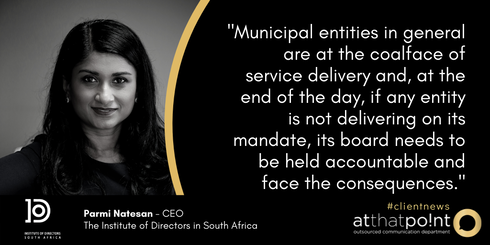
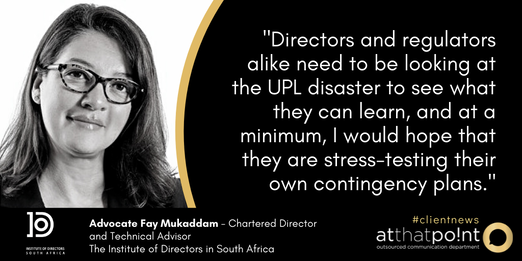
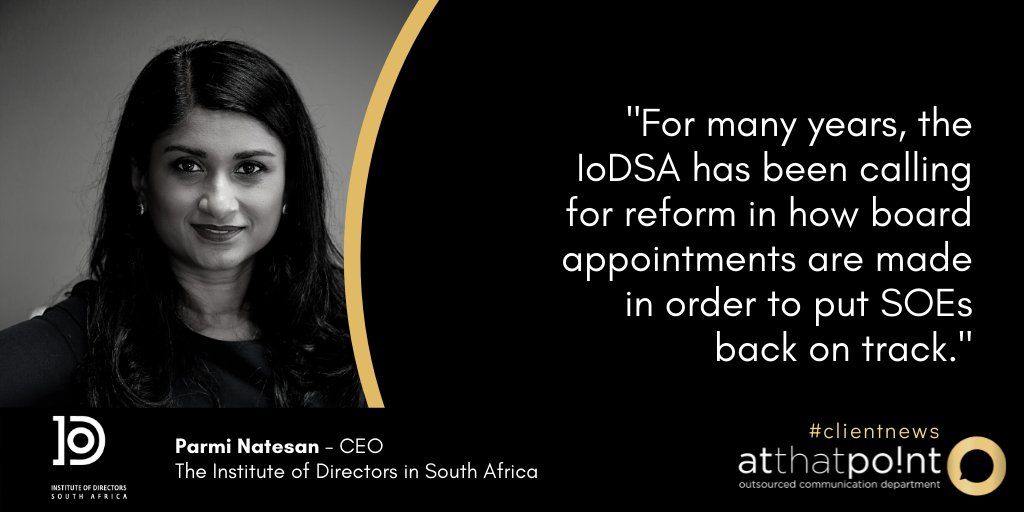
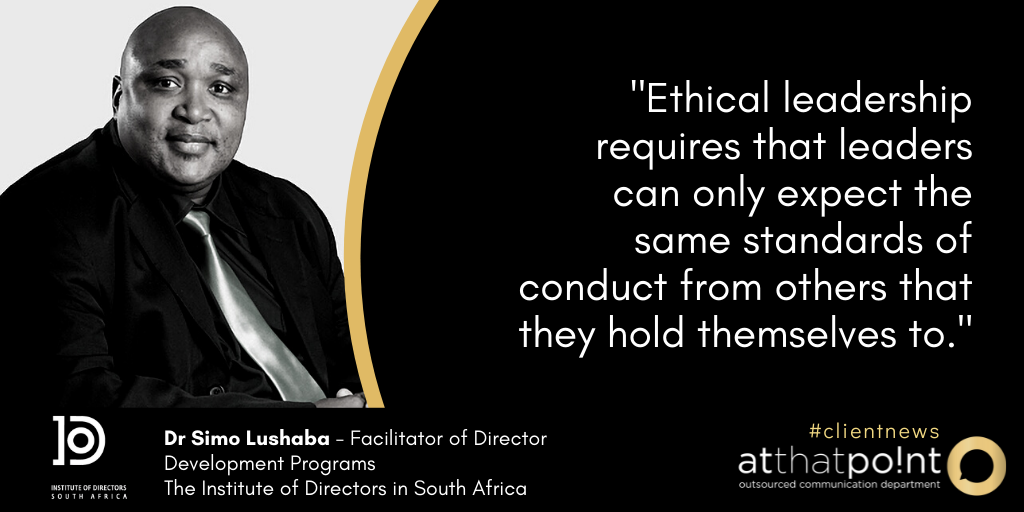
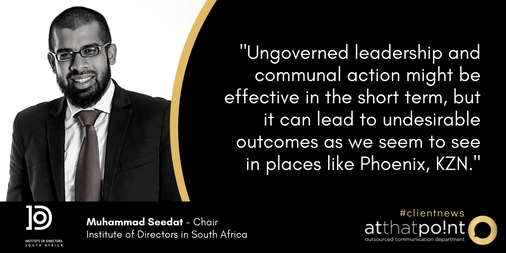
 RSS Feed
RSS Feed